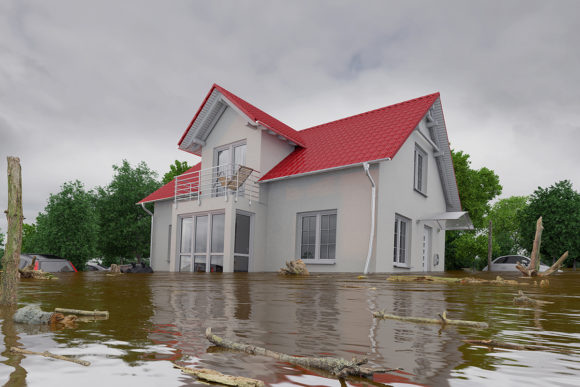Even Governors Skeptical of Climate Change Can’t Avoid Need to Plan for Future Storms, Fires
Governors have a range of priorities they want to tackle in the coming year, from tax reform to education. Yet, one topic that receives less attention on the campaign trail that could determine their success is natural disasters.
In the last two years, storms and natural disasters have killed scores of people, damaged or destroyed tens of thousands of homes and cost tens of billions of dollars.
Wildfires in the West and hurricanes in the South have been especially destructive, and scientists say climate change is making this more common. As the severity escalates, governors are finding they have to prioritize disaster planning or risk the consequences of inaction.
Handling disasters and emergencies was a prime topic in November when the incoming governors met at the National Governors Association meeting.
“As California’s wildfires, a spate of hurricanes, and unfortunate acts of mass violence have demonstrated, such events can occur at any time,” Scott Pattison, the nonpartisan association’s chief executive, said in a statement, “including a governor’s first day in office.”
West Coast Wildfires
In California, half of the 10 most destructive wildfires in state history have occurred since 2017, and the costliest have been in each of the past three years, according to the state. During his campaign, new Gov. Gavin Newsom said wildfire planning would be a priority, and he outlined steps he wants to take. Among them is a more aggressive approach to clearing trees and brush, particularly millions of dead trees.
“I’d rather see our National Guard working on those kinds of emergencies than being on the border,” Newsom told CALmatters over the summer. He also proposed deploying infrared cameras to detect wildfires early, improving the emergency alert system and boosting funding for fire departments throughout the state.
Other Western states also have experienced wildland blazes. In Colorado, the two most destructive wildfires erupted within the last six years, killed four people and destroyed more than 850 homes combined. Both are believed to have been caused by humans, leading Democrat Jared Polis, Colorado’s new governor, to call for an education campaign to reduce the possibility of wildfires. He also said the state should begin removing flammable debris and help communities and landowners take steps to prevent the spread of wildfires.
East Coast Hurricanes
Florida has been hit with two destructive hurricanes in roughly a year’s time. Hurricanes Irma and Michael caused tens of billions of dollars in damage.
Even without hurricanes, many coastal communities are dealing with flooding from high tides and storm surges. Florida Gov. Ron DeSantis, a Republican, has said he will work with local governments to address rising sea levels, but has been criticized by Democrats for avoiding any mention of climate change. DeSantis has said he is neither a climate change “denier” nor a “believer.”
That could be a problem for identifying long-term solutions to keep coastal communities safe, said Jen Hensley of the Sierra Club. She said one reason Michael was so devastating was a lack of strong coastal development standards. “We’re going to have to change zoning rules in coastal areas,” Hensley said. “The reality is that those areas are more flood prone than they’ve ever been.”
Texas Storms
It’s similar in Texas, which has seen widespread destruction from hurricanes. Republican Gov. Greg Abbott has sought $12 billion from the federal government for a 60-mile coastal “spine” of concrete seawalls, floating gates and steel levees as a defense against hurricanes and higher tides. That’s just a fraction of the work the state estimates needs to be done to reduce the impact of flooding.
Governors in New York and New Jersey pushed for changes after Superstorm Sandy in 2012. New York Gov. Andrew Cuomo, a Democrat, signed a law requiring sea level rise projections to be used whenever the state considers funding for projects.
Then-New Jersey Gov. Chris Christie, a Republican, pushed to buy homes in flood-prone areas, although environmentalists criticized him for not addressing climate change.
Those groups cheered last year when Democrat Phil Murphy was elected to replace Christie, but they say he’s not taking action to address global warming.
Topics Catastrophe Natural Disasters Wildfire Flood Hurricane Climate Change
Was this article valuable?
Here are more articles you may enjoy.



 Trapped Tesla Driver’s 911 Call: ‘It’s on Fire. Help Please’
Trapped Tesla Driver’s 911 Call: ‘It’s on Fire. Help Please’  What Analysts Are Saying About the 2026 P/C Insurance Market
What Analysts Are Saying About the 2026 P/C Insurance Market  Winter Storm Fern to Cause Up to $6.7B in Insured Losses
Winter Storm Fern to Cause Up to $6.7B in Insured Losses  Former Ole Miss Standout Player Convicted in $194M Medicare, CHAMPVA Fraud
Former Ole Miss Standout Player Convicted in $194M Medicare, CHAMPVA Fraud 


